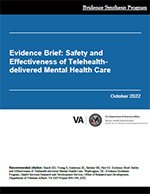
Recommended Citation:
Beech EH, Young S, Anderson JK, Belsher BE, Parr NJ. Evidence Brief: Safety and Effectiveness of Telehealth-delivered Mental Health Care. Washington, DC: Evidence Synthesis Program, Health Services Research and Development Service, Office of Research and Development, Department of Veterans Affairs. VA ESP Project #09-199; 2022.
Download PDF: Brief, Supplemental Materials
Available evidence on the safety and effectiveness of telehealth-delivered mental health treatment compared with in-person delivery of the same treatment is limited mainly by inconsistency in study populations, interventions, comparisons, and outcomes. Most identified studies focus on posttraumatic stress disorder (PTSD). PTSD symptom severity appears similar after in-home video teleconference and clinic-based in-person delivery of individual psychotherapy, based on low-strength evidence.
Telehealth delivery may address barriers that prevent Veterans from seeking mental health care, such as lack of access to mental health services and negative stigma associated with utilization of mental health services. To inform VA clinical practice, we evaluate whether existing evidence shows that synchronous in-person or telehealth-based mental health care are similarly safe and effective in the treatment of mental health conditions common among Veterans.
Available evidence on the safety and effectiveness of telehealth-delivered mental health treatment compared with in-person delivery of the same treatment is limited mainly by inconsistency in study populations, interventions, comparisons, and outcomes. Most identified studies focus on PTSD. PTSD symptom severity appears similar after in-home video teleconference and clinic-based in-person delivery of individual psychotherapy, based on low-strength evidence. Less evidence was available for other mental health conditions. Evidence on safety, limited to 8 studies, indicated that adverse events were rare and did not appear to be associated with delivery modality. Few trials directly compared 1 telehealth modality to another, and little evidence was available examining the effects of clinical characteristics on effectiveness or safety outcomes. Future research is needed to determine whether the effectiveness and safety of telehealth-delivered mental health care differs based on treatment modality, format, or presenting mental health condition.
Evidence Brief: Safety and Effectiveness of Telehealth-delivered Mental Healthcare (Management e-Brief)